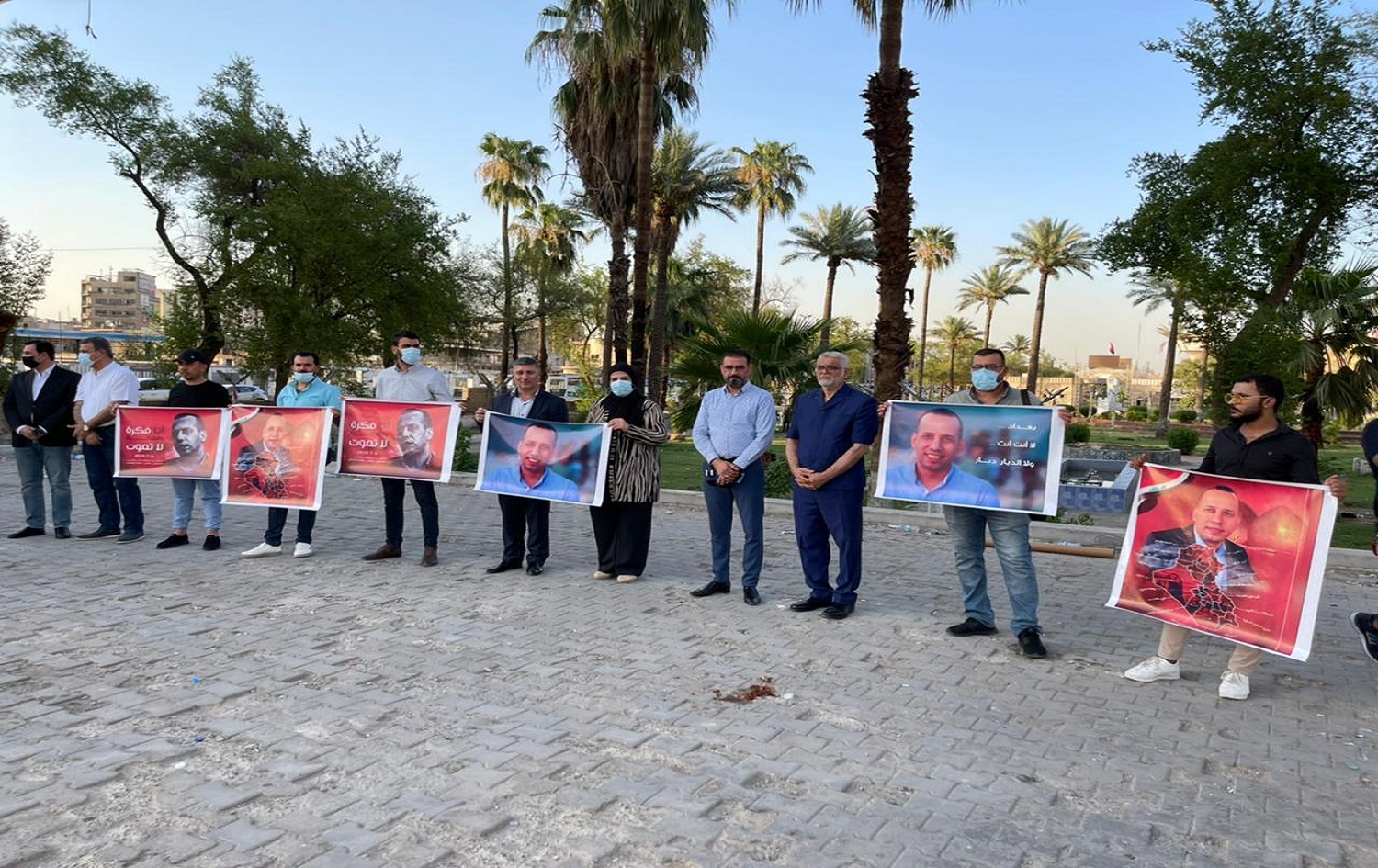
Mourners carry the coffin of Husham al-Hashimi after his assassination in Baghdad on July 6, 2020. Photo: AFP
ERBIL, Kurdistan Region — Around 40 days have passed since the Iraqi government last promised to reveal the killers of Husham al-Hashimi, assassinated a year ago outside of his Baghdad home on July 6, 2020.
Hashimi, who was a close friend of Prime Minister Mustafa al-Kadhimi and an advisor in his government, was let down by the government he served, which has not held the perpetrators accountable or taken preemptive measures to prevent other assassinations.
Born in Baghdad in 1973, Hashimi was a leading security expert, member of the Iraq Advisory Council and former advisor to the US-led coalition to defeat the Islamic State (ISIS). He also served as a nonresident fellow with the Center for Global Policy (CGP).
He wrote regularly about terrorism and armed militias in Iraq, and authored a detailed series of publications on the ongoing threat of ISIS for CGP. He also focused on the role of Shiite militias in Iraq, and was a strong supporter of the protest movement that swept across the country in October 2019.
The father-of-four “represented hope that a different Iraq was possible,” Emma Sky, a former political advisor to the US military command in Iraq, said in an article following his death.
Endless impunity
Hashimi’s assassination is surrounded by murky details, conflicting statements and empty pledges to bring his killers to justice.
Ever since his death, repeated promises have been made to reveal Hashimi’s assassins, with Prime Minister Mustafa al-Kadhimi promising they would not sleep until his killers were brought in front of the law. Instead, many more have been slain – with similar promises made to reveal their killers.
On Tuesday, a group of well-known journalists and activists gathered to commemorate his death, denouncing impunity and calling for the killers to be held accountable.
"The killers cannot escape punishment. A year has passed since the assassination of Hashimi and his killers have not been held accountable. Hashimi gave a lot to Iraq," journalist Majid al-Khalidi, who attended the gathering at Tahrir Square, told Rudaw English on Tuesday, saying his death was a "great loss."
In late May, military spokesperson Yehia Rasool, speaking for Kadhimi as Iraq’s commander-in-chief, said investigations into the analyst’s death were ongoing, and “time must be given” for intelligence to complete investigations.
His statement came one day before a mass demonstration, drawing thousands from across Iraq, to demand an end to impunity for those responsible for the murders of dozens of activists, journalists, and protesters.
The rally was fueled by anger after its mastermind, Karbala activist Ihab al-Wazni, was killed outside his home in May.
Two weeks after Hashimi’s assassination, an advisor to Kadhimi told the Washington Post that the PM’s hands were tied over the matter, with the reveal of the perpetrators a dangerous move.
“Launching a full-blown investigation into why this happened, well, that is simply too dangerous for any prime minister here.”

In a televised interview in October, the PM confirmed “some leads” had been identified in the case, but authorities were awaiting “the appropriate time” to reveal them.
Just over a month later, government spokesperson Ahmed Mullah Talal said that two of the killers had been identified, had been smuggled abroad, and the government was working to bring them back. He resigned soon after.
“Perhaps the strongest message of impunity was sent by the killers of Dr. Hisham al-Hashimi,” Human Rights Watch said in May.
There have been 81 attempted assassinations of activists since the anti-government protests began in October 2019, according to Ali al-Bayati, a member of the Iraqi High Commission of Human Rights. Thirty-four activists have been killed.
Hashimi was killed after criticizing Iran-backed militias, some part of the Popular Mobilization Forces (PMF or Hashd al-Shaabi in Arabic), for challenging the state, in addition to their affiliation with the murder of activists and protesters.
The day after his death, the dissident Sadrist leader and prominent political activist Ghaith al-Tamimi published previous conversations between him and Hashimi, in which Hashimi said that he had been threatened by Iranian-backed militia Kataib Hezbollah.
Tamimi also said that he himself was threatened by Mohamed Baqer Sulaimani, a member of the militia and personal assistant of General Qasem Soleimani, who was killed in a US airstrike in Baghdad last year.
The PMF was established in 2014 following a fatwa – a religious call to action – from Iraq’s highest Shiite religious authority, Ayatollah Ali al-Sistani, to fight ISIS.
However, several pro-Iran militias – established to fight the US occupation in 2003, then insurgent Sunni groups during the ensuing civil war – joined the PMF, many of them becoming proxies for Iran’s political and military interests in Iraq.
Two months before his assassination, Hashimi spoke in a televised interview with UTV about what he called the “duality of state and non-state”, criticizing armed factions affiliated with the PMF.
"They are the PMF when America bombs them, and they are resistance factions when they bomb America, they are the PMF when they need money, salaries and weapons from the state, and they are resistance factions when they violate the state's policy," he said.
Iran-backed militias are suspected to be behind his death, and those of many others. Wazni’s mother has accused Qasem Musleh, a PMF leader from Anbar, of killing her son. Musleh was arrested on charges of terrorism and responsibility for Wazni’s death, but was released shortly after due to an alleged lack of evidence.
Wazni’s mother has rallied for justice ever since his death, holding sit-ins and meeting with the United Assistance Mission to Iraq (UNAMI) chief Jeanine Hennis-Plasschaert, who was slammed by the family for inaction.
"I told Plasschaert that the United Nations is complicit with murderers, and it takes bribes from the corrupt. We don't want Plasschaert to denounce or express concern, we want action," Wazni's brother Ali told Rudaw English.
But so far, justice for Wazni, as for Hashimi, has yet to be achieved.








Comments
Rudaw moderates all comments submitted on our website. We welcome comments which are relevant to the article and encourage further discussion about the issues that matter to you. We also welcome constructive criticism about Rudaw.
To be approved for publication, however, your comments must meet our community guidelines.
We will not tolerate the following: profanity, threats, personal attacks, vulgarity, abuse (such as sexism, racism, homophobia or xenophobia), or commercial or personal promotion.
Comments that do not meet our guidelines will be rejected. Comments are not edited – they are either approved or rejected.
Post a comment